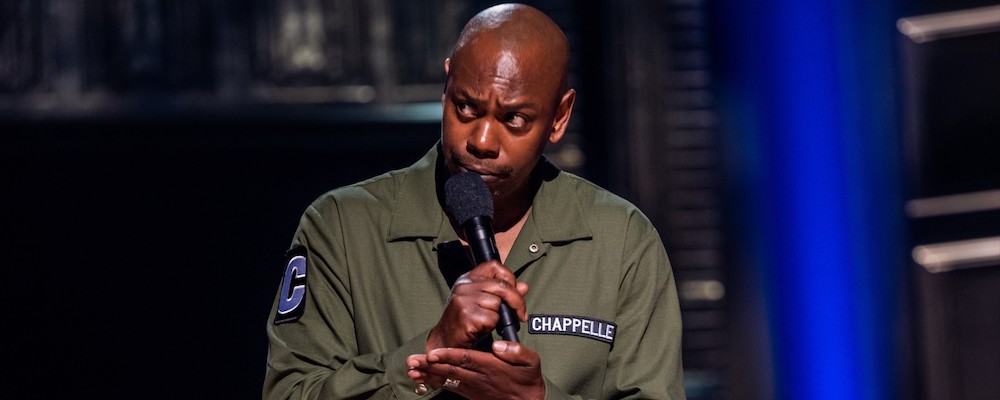Dave Chappelle Wins and Loses With Netflix Comedy Special ‘Sticks & Stones’
Alci Rengifo
There’s a difference between being a provocateur and then just being provocative for its own sake. Dave Chappelle walks and stumbles on the fine line between both in his Netflix special, “Sticks & Stones.” It is true that these two objects can break more bones than mere words, but Chappelle uses language like dynamite, poking at hot topics with the glee of an arsonist. Sometimes it’s devilishly hilarious in this performance, other times it feels like that guy at the party who makes uncomfortable remarks.
Filmed at Atlanta’s the Tabernacle, Chappelle is catching up with all the headlines since his last special, 2017’s “Equanimity and the Bird Revelation.” Crooning Prince’s “1999,” he ponders with vicious hilarity why those who have it great decide to commit suicide. His first example is Anthony Bourdain, who killed himself even as he had, “the greatest job that show business ever produced. He flew around the world and ate delicious meals with outstanding people.” Chappelle ponders, “That man, with that job, hung himself from a luxury suite in France.” By contrast a friend who went to law school and lost it all in a divorce after marrying too soon, then finding himself managing a Foot Locker, lives alright. It’s the kind of observant humor Chappelle is sometimes undervalued for. He can make a lucid point dipped in acid.
But a curious imbalance begins when Chappelle starts swimming in riskier waters. Maybe it’s because unlike “Equanimity,” there’s not a true, central theme here. He addresses the controversy over the HBO documentary “Leaving Neverland,” admitting he doesn’t believe the two men who accuse Michael Jackson of molesting them as children. And even if it is true, maintains Chappelle, they were at least molested by a pop icon while most victims simply have to deal with “awkward Thanksgivings for the rest of our lives.” The comedian even admits that he’s more of a “victim-blamer” anyway. There are flashes of funny here, but it’s a rather dicey subject. The funnier half is when Chappelle compares that case to R.Kelly, who he has no doubt is guilty. Apparently several documentaries have approached him to make an appearance and he refuses for the simple reason that, well, he doesn’t know the guy. Chappelle is also astounded at how many sex tapes have emerged of the singer, “he makes more sex tapes than he does music. He’s like the DJ Khaled of sex tapes!”
Chappelle has been criticized before for his jokes about the LGBTQ community and in “Sticks & Stones” it is indeed where he falls the flattest. He uses a joke about Kevin Hart’s tweetgate and the Oscars to segue into a long commentary about how in the industry you can’t criticize “the alphabet people,” but you can use the N-word. There might have been a more challenging, valid point to be made in this section, but instead of going deeper Chappelle twists it into a joke about not understanding trans people. He compares being trans to being a black man who feels Chinese, complete with making a face and voice. Chappelle’s cover is that his wife is Asian, but the real issue is that it’s simply not very funny. His takedown of the term LGBTQ itself plays that old joke of, “I’m not racist because I have (place your preferred ethnicity here) friends.” The funniest moment in this section is when an audience member’s cell phone goes off and Chappelle says, “what is this, high school? They’ve probably got a babysitter, go answer the phone.”
What’s missing is better context, as with “Equanimity” where Chappelle brilliantly took on the ultra-PC culture. He dared the audience to be uncomfortable and openly flaunted what a lot of people think, but won’t say. There was even some genuine, moving depth when Chappelle paused to tell the story of Emmett Till. In “Sticks & Stones” the material begins to run dry because it’s unfocused, despite moments of genuine comedic punch. It works best precisely when Chappelle goes into more satirical social commentary that lacks cheap shots. One of the best bits is when he discusses the ongoing opioid crisis, pointing out that white communities are now experiencing what black neighborhoods went through during the crack epidemic. “I have insight into how the white community felt watching the black community go through the scourge of crack…because I don’t care either,” says Chappelle. “Hang in there whites, just say ‘no.’ What’s so hard about that?” If only the rest of the special had that kind of fire in the belly. Mass shooters are tackled as well with lively bits wondering why they can’t just deal with anger the way regular people do.
“Sticks & Stones” isn’t necessarily a failure, it just feels like Chappelle presenting half-formed material with few jokes that truly hit hard and stand out. He can still grab a crowd’s attention, but it’s a harder job to provoke than to merely offend.
“Dave Chappelle: Sticks & Stones” begins streaming Aug. 26 on Netflix.

